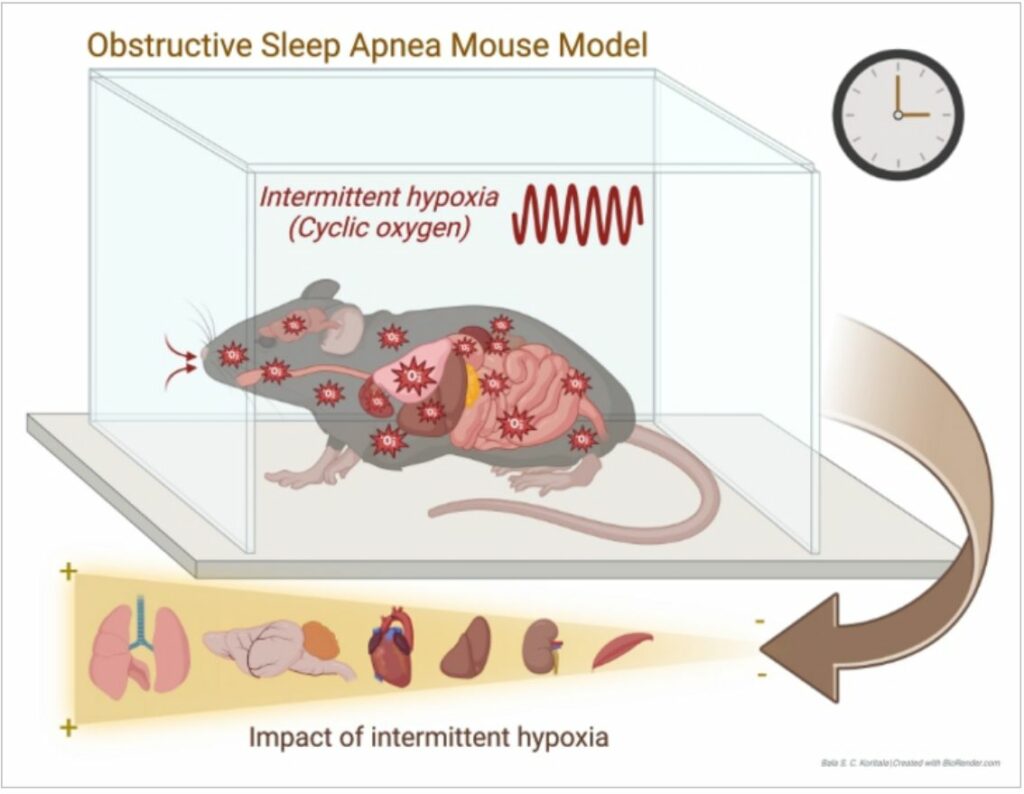A new study uncovers “early biological changes” linked to Obstructive Sleep Apnea, “occurring across multiple organ systems.”
A recent study conducted by David Smith and colleagues from Cincinnati Children’s Hospital Medical Center in the United States has revealed that the low blood oxygen levels associated with obstructive sleep apnea have a profound impact on gene activity throughout the day.
The findings of this study, published in the open-access journal PLOS Biology, hold potential for the development of diagnostic tools that can aid in earlier detection and monitoring of this disorder.
Obstructive sleep apnea (OSA) is a condition characterized by the blockage of the airway, usually caused by soft tissue, resulting in snoring, interrupted breathing during sleep, and intermittent hypoxia (low blood oxygen). This disruption of sleep has far-reaching effects and poses risks to cardiovascular, respiratory, metabolic, and neurologic health. OSA affects a significant portion of the global population, with over one billion individuals affected, and in the United States alone, it incurs direct medical costs amounting to $150 billion annually.
Gene activity naturally fluctuates throughout the day, partly driven by circadian clock genes that regulate the rhythmic variations in approximately half of the genome. Additionally, external factors, such as reduced oxygen levels, lead to the production of “hypoxia-inducible factors,” which influence the activity of numerous genes, including clock genes. To gain deeper insights into how OSA affects gene activity over the course of a day, the researchers exposed mice to intermittent hypoxic conditions. They then analyzed the entire genome’s transcription in six different tissues: lung, liver, kidney, muscle, heart, and cerebellum. Subsequently, they examined the variations in the circadian timing of gene expression in these tissues.

The most significant changes were observed in the lung, where intermittent hypoxia affected the transcription of nearly 16% of all genes, primarily upregulating their activity. The heart, liver, and cerebellum showed an impact on approximately 5% of genes. Interestingly, the subset of genes that naturally exhibit circadian rhythmicity experienced even more substantial effects due to intermittent hypoxia. In the lung, about 74% of these genes displayed significant changes, while the heart showed alterations in 66.9% of such genes. Among the affected genes in each tissue were those known as clock genes, highlighting their contribution to the significant changes in circadian activity observed in these tissues.
The results of the study “provide novel insight into the pathophysiological mechanisms that could be associated with end-organ damage in patients with chronic exposure to intermittent hypoxia,” as explained by Smith, “and may be useful to identify targets for future mechanistic studies evaluating diagnostic or therapeutic approaches.”
For example, one potential avenue could involve the development of a blood test that tracks the levels of a dysregulated gene product, allowing for early detection of obstructive sleep apnea (OSA).
“Our study using an animal model of Obstructive Sleep Apnea unveils time- and tissue-specific variations of the whole genome transcriptome and associated hallmark pathways,” says Bala S. C. Koritala.
“These unique findings uncover early biological changes linked to this disorder, occurring across multiple organ systems.”
Source: 10.1371/journal.pbio.3002139
Image Credit: Getty
